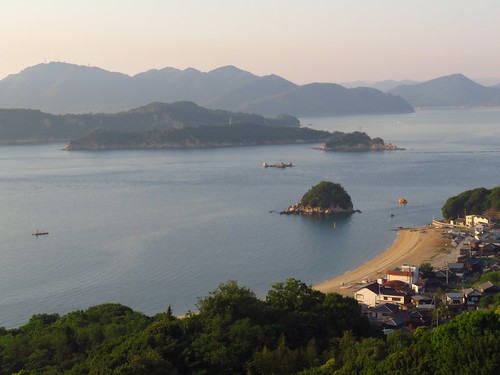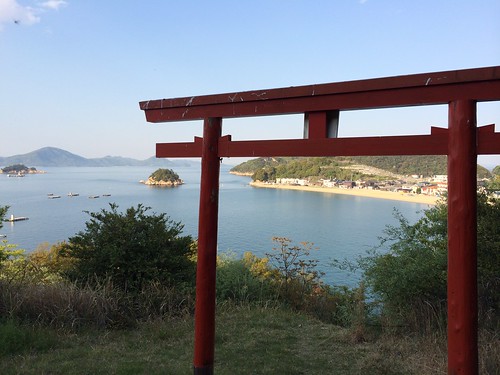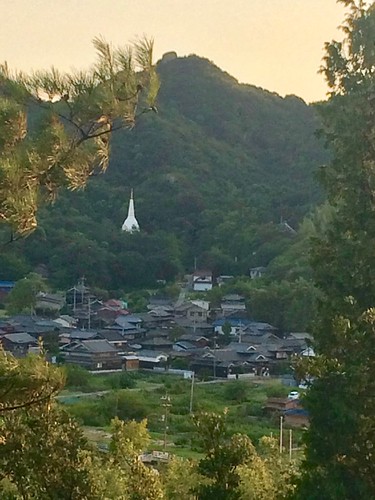Once in a great while, you come across a book so compelling, interesting, and important that you want to share it with everyone. Such is the case with the latest book from author Amy Chavez, entitled The Widow, The Priest and The Octopus Hunter: Discovering a Lost Way of Life on a Secluded Japanese Island, published by one of our favorite publishers, Tuttle.

This extraordinary book is a glimpse into the history and daily lives of the people living on a small island in Japan. Chavez interviewed over 30 residents, and we learn much about Shiraishi Island through their oral histories and Chavez’s rich ethnographic writing. I marveled at how we can directly see how the past juxtaposes with the present; was saddened by development and decreasing population—and the ensuing loss of such a unique way of life; and felt grateful to glimpse and get to know this living history.

Shiraishi Beach
I felt as if I knew each person, through their beautifully-written stories, and, once finished, started reading this book from the beginning again. Each story is a gem: thoughtful, interesting, with SUCH a sense of place and time. Chavez’s storytelling has no equal; she is, hands down, the best cultural anthropologist I’ve ever read.
The world has so much to learn from our elders; this book is, in my opinion, a must-read for people interested in history, Japan, living sustainably, travel, stories, cultural anthropology, community, a life well-lived…honestly, everyone.
Highly, highly recommended.
Amy Chavez has been a columnist for The Bali Times, HuffPo, and The Japan Times (the latter 23 yrs). Her articles have been published in newspapers and magazines around the world, including Japan, the UK, US, Canada, Taiwan, Indonesia, and New Zealand. She lives in Japan and is also the author of Amy's Guide to Best Behavior in Japan: Do it Right and Be Polite!

We were lucky enough to catch up with Amy Chavez, and ask about the book, inspiration, challenges, writing, and more. Here’s what she had to say…
Please tell us about your new book The Widow, The Priest and the Octopus Hunter…
The Widow, The Priest and The Octopus Hunter: Discovering a Lost Way of Life on a Secluded Japanese Island was released by Tuttle Publishing in Japan in July, 2022 and in other countries in May. It’s an oral history of the inhabitants of Shiraishi Island (population 392) in the Seto Inland Sea, where I’ve lived for the last 25 years. When I first moved to the island, there were 950 people and I rented a house from a WWII war widow. This started my curiosity about war widows, WWII and the lives people led on these islands during that time. I interviewed 31 people on how their lives have changed over the years, and uncovered unusual customs and manners, some of which are still in place today, but all which are threatened with extinction because of depopulation. So the book covers the customs and culture of the Inland Sea for the past century in Japan.

Fishing boat, Shiraishi Island
What inspired you to write this book?
A few things. First, I was curious about who my neighbors were. These days, we don’t really give much thought to who lives next door to us, let alone who lives down the street. If we do take notice, it’s usually because some conflict has arisen that has made us aware of the other. But if we get to know people beforehand, then when conflicts do arise, it’ll be much easier to deal with them because we’ll know a bit more about that person and why they're acting the way they are. There are some really fascinating people out there disguised as perfectly boring people. I found that once I took an interest in others, I found their stories to be incredibly intriguing.
While, I already knew a lot of people here on Shiraishi Island, there were still many who I had never had the chance to talk to. Like the guy who rides past my house in his mobility cart. I found out he is a 97-year-old WWII veteran. There was a woman I used to see sitting in her window looking out to the sea. I knocked on her door one day, and she was very welcoming and happy to tell me about how she came to Shiraishi as a bride during the American Occupation. I spoke with others too: a cargo ship captain, a tombstone maker, a Shinto priest, a fisherman, a mother of 11 children, a match-maker, an innkeeper, a stone-cutter, a Buddhist priest and an octopus hunter. All these people told me the most fantastic stories of old Japan.

I'm sad to report that the Stone Bridge Lady (p. 27) has passed away at 97 years old. Ishibashi-nechan (older sister Ishibashi) as everyone called her, was the powerful force behind her husband who brought many modern conveniences to Shiraishi Island in the 1960's, including running water and roads. She was lovely to talk to, always lively, and gifted me much of her time describing the old ways of Shiraishi Island. She told me stories of seeing ghosts and about her visit to the Imperial Palace in Tokyo. The Stone Bridge Lady was born on Shiraishi Island in Taisho 14 (1925), and her father was a fisherman in the Meiji Period. She married her cousin Ryosaku in 1947, and lived a long and healthy life up until last week, when she fell ill and passed a few days later. I'll always remember her singing to me Edo period hauta songs in her living room, and together singing the festival songs on NHK TV. She will be missed by many. May she rest in peace. Below is a picture of her as a child, in kimono, with her family. Her father is in a formal samurai outfit and her mother is in kimono, wearing the marumage hairstyle of the era.
The second reason I wrote the book is because there are no books about the Seto Inland Sea except for Donald Richie’s classic, The Inland Sea. The islands have certainly become more popular in the last few years, as tourism has developed in areas, such as the Benesse Art Islands and the Shimanamikaido, where you can cycle over bridges to seven islands. While those developments are welcome, no one has taken an interest in the cultures and people that still exist on these islands and whose culture those tourist attractions are, in many ways, destroying. It reminds me of a quote from one of the interviewee’s for my book (The Bon Dance Director), who said “These days, Japanese people have so many famous places to go. There’s even modern art on some of the islands. So people know more about the new things and less about the old… I understand why people live in more convenient places, but if you live where life is too easy, you’ll forget the old ways. You won’t keep in mind the things your parents and grandparents taught you. You should at least try to keep the best parts of tradition.”
So I wanted to document these people’s lives so they will not be forgotten. We can keep these best parts of tradition so they at least live on through words, even after the people themselves are long gone.
What were the challenges of writing this book?
The challenges of writing an oral history were immense, but probably aren’t the things most readers would imagine. Putting the book together took three years of full-time work, basically eight hours a day. The process for each interview was: interview, record, transcribe, translate, edit the stories and then put together a story around them. Luckily, I was able to translate the interviews myself and I'm familiar with the local dialect, but I still had to hire two research assistants and a Japanese teacher to help decipher parts of the interviews I didn’t understand both culturally and linguistically. Unfortunately, I wasn’t successful getting any funding for the project, and I’m not connected with a university, so it really ended up being a passion project. My health definitely suffered from the workload, as well. I’m really thankful to Tuttle Publishing, who considered the results of my project worthy of publishing.

What surprised you most about conducting and writing this study in cultural anthropology?
One of the sub themes of the book is Japan’s war widows, and while I was aware that my house was previously owned by a war widow, I didn’t realize the depth and sadness in her life until I started uncovering clues: kimonos, baby clothing, a child’s grave, a picture of Emperor Hirohito, and other things that suggested deeper stories. I started asking my interviewees about her, at least those who are old enough to have remembered her, and the more I uncovered, the more I realized that this topic of the plight of Japanese war widows has been brushed under the table. There’s not much information in English on this topic, so I wanted to bring that to light. We had 21 war widows on Shiraishi Island, and while they’ve all passed away now, I was able to interview one of their daughters. Her father was killed in the Second Sino-Japanese war (1937) when she was three years old and her widowed mother married her father’s younger brother. Her mother and uncle produced another child, her younger sister. This type of thing happened often because the widows had no way of surviving on their own if they had children to feed, so many married their husband’s brothers in order to keep wealth, property, and children within the family.

"The now dilapidated former inn has been painted over so many times, all the layers of color are peeling. The first floor looks as if someone shut up shop fifty years ago, tossed the key and walked away. If a guest from back in the day came to visit-and they occasionally do-they'd find it just as they remembered it from childhood. The hand-cranked shaved ice machine sits irreverently in the corner. On the walls, inked paper portraits of sumo wrestlers of yore curl at the corners. Aging display fridges that refuse to chill, now feature stuffed animals of equal vintage peering out. The only thing new is another layer of the yellowish, salt-encrusted patina of fifty years of sea breezes." (p.95, The Runaway)
How do you think Shiraishi is changing with the times...and how does it affect the quality of life for those still on the island?
Well, it’s not really changing fast enough to be able to save the island and community. The population will continue to decline, and even now we’re losing services because the population is too low to support frequent ferries, a school, or an on-site doctor. There are many things that could be done to revitalize the island (appeal to remote workers, artists, people interested in buying vacation homes, etc.) but the local government has no interest in revitalizing the islands, which is really sad, in my opinion.

It is my feeling that others could learn a lot from the lifestyle here. Nowadays we’ve put new names to old traditions with catch phrases like “sustainability,” “upcycling," and “gift economy." Yet these concepts have always been core values of life on Shiraishi Island. The locals never strayed from living off the land, gathering roots and herbs, growing their own vegetables, fixing their own houses, or sharing their skills and products. I walked up to do our annual temple cleaning the other day with an elderly woman whom, when I commented on the beautiful kasuri pants she was wearing, told me she weaved the cloth herself on a loom! “They’re cotton, so they’re cool,” she said. That got me to thinking that, you know, it’s hard to even buy one hundred percent cotton clothing these days.
So while the rest of the world is back-pedaling on climate change, and wondering how to right all the wrongs, the people here have always kept the preservation of nature at the heart of their activities and traditions. They still perform ceremonies to thank the gods, to appease the goddess of the sea, to honor the mountain god. They still live in harmony with the seasons. It is no mystery to them as to how to live sustainably; it’s logical. This small backwater is now what environmentalists aspire to. These people should be our teachers.

How can people find your work?
You can buy my books at regular English book shops such as Kinokuniya and Maruzen in Japan (and abroad), online at the Laughing Oyster Bookshop in Canada, and of course at Amazon and Amazon Japan.
Tip #1: If a bookstore doesn’t stock the book, you should be able to order it by giving the book's ISBN number: 978-4-8053-1691-7 (The Widow, The Priest and The Octopus Hunter)
Tip #2: You can always order it at your local library and have them buy it for you. Thank you!
I have a Facebook page where I give tips on Japanese etiquette using real life examples here on the island. https://www.facebook.com/amyonasia
And on my personal Twitter account: @JapanLite
To follow my updates about living on a small island of 392 people in Japan’s Seto Inland Sea, I post frequently to this dedicated Facebook page for the book: https://www.facebook.com/DiscoverShiraishi/
For those interested in visiting, Shiraishi Island has a beautiful beach, hiking trails, a pilgrimage trail and a decent guesthouse called Shiraishi International Villa.
I also run a book review site and podcast called Books on Asia
Website: Books on Asia
Twitter: @BooksOnAsia
Subscribe to the BOA podcast at https://linktr.ee/booksonasia

On the last day of Obon, the Buddhist Priest (The Accidental Hermit, p.183) sends off the spirits from the beach in a ceremony called "toronagashi." The spirits are sent sent off with candles inside paper lanterns afloat on the sea. However, this year was very windy, and the priest struggled to even be able to get through the sutras and prayers! This event signals the end of Obon.
All photos courtesy and copyright Amy Chavez, published with permission. Word photo copyright Wandering Educators
